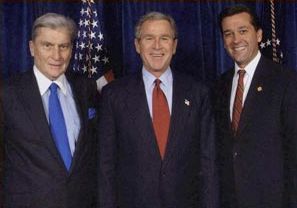Overview
The thing I like about this fella, he grew up in Virginia, he grew up on a small farm. That means he's a down-to-earth person; he doesn't have a lot of fancy airs. — George W. Bush, in an appearance at Richmond International Airport on the night of 7 November 2005 to boost the candidacy of Jerry Kilgore for governor of Virginia.
A total of 2 gubernatorial elections, 493 mayoral elections, and 41 ballot measures were decided by U.S. voters on 1 and 8 November 2005. The 2005 elections were known as "off-year" elections, since no Presidential or midterm Congressional races were being decided. Other than state and local issues, the most significant backdrop to the 2005 races was the sharp increase in President Bush's negatives in national polls, a development which gave the November elections added significance to political observers and pundits, if not to the voting population as a whole.
On 2 November 2004, George W. Bush was re-elected with what the major media and pundits called a "mandate" ("by any measure a decisive mandate for a second term," according to the Wall Street Journal) after a divisive and acrimonious campaign against Massachusetts Senator John Kerry, who had won the Democratic nomination in March 2004 after only token opposition. (Former Vermont Governor Howard Dean mounted what was at first considered a strong challenge to Kerry, but Dean's campaign ended in disaster in January 2004 after a series of blunders by the candidate.)

In actuality, although Bush defeated Kerry by 286-252 in the electoral vote count, and by well over 3 million votes in the popular count, an essential component of the media's calling Bush's second victory a "mandate" was that there was more ambiguity about Bush's initial election in 2000 than at any time since the disputed election of Rutherford Hayes over Samuel Tilden in 1876. That Bush's second victory was something less than a resounding vote of confidence became clear in the year after the election, as his poll numbers plunged to levels lower than those of any second-term president elected since the end of the Second World War (with the exception of Richard Nixon's numbers in 1974, at the height of the Watergate scandal). Bush's handling of the war in Iraq and the aftermath of Hurricane Katrina, along with uncertainties about the performance of the economy, contributed to his falling poll numbers and to the perception that he was, like most of the presidents who preceded him and who won second terms, faltering. However, apart from the high-profile gubernatorial races in New Jersey and Virginia, which were both won by Democrats, the opposition party was largely unable to capitalize on Bush's woes.
Many of the most noteworthy mayoral races around the country were victories by challengers over well-known incumbents. The most widely cited example of this phenomenon was Chris Coleman's defeat of Randy Kelly in St. Paul, a race that was an anomaly in that Kelly's performance as mayor was not in question, but rather his widely-publicized announcement in August 2004 that he would endorse Bush's re-election, a decision that infuriated the city's mostly Democratic constituents. The flip side of this phenomenon was Kwame Kilpatrick's controversial victory over Freman Hendrix in Detroit, an instance of an incumbent beating a challenger who was widely predicted up to 24 hours before the election to have an insurmountable advantage over the mayor. Other significant upsets in national mayoral races included elections in Manchester (New Hampshire) and New Bedford (Massachusetts).



|